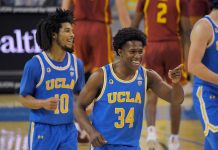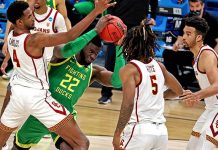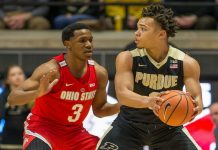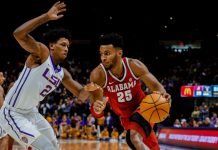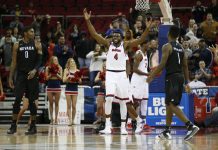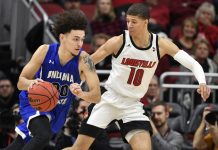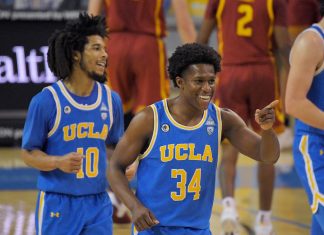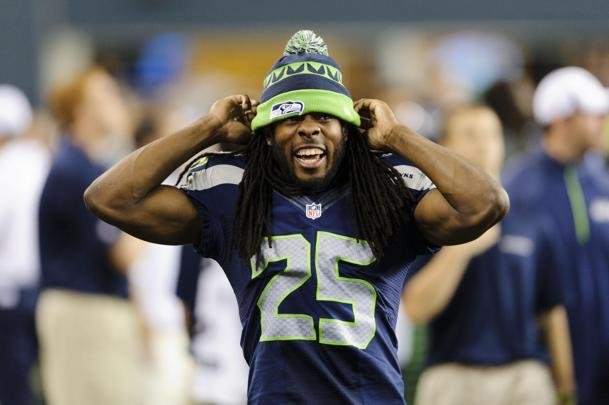The cracked facade of NCAA hoops appears to be crumbling and while LeBron James, John Calipari and many agree that college basketball should be overhauled, there’s no consensus on how to repair the system.
A federal investigation has alleged hundreds of thousands of dollars in bribes and kickbacks being funneled to influence recruits, an FBI probe that many fans believe reveals just a tiny slice of potential corruption in college sports.
In September, the Justice Department arrested 10 people, including four assistant coaches from Arizona, Southern California, Auburn and Oklahoma State. Payments of up to $150,000, supplied by Adidas, were promised to at least three top high school recruits to attend two schools sponsored by the shoe company, according to federal prosecutors.
A report last week by Yahoo! Sports revealed documents showing dozens of prominent players, coaches and schools could be involved in – while likely not criminal behavior – breaking NCAA rules. All this looms over college basketball as March begins, the month when championship tournaments and brackets take center stage across America. The cash cow of college sports that brings in hundreds of millions of dollars to the NCAA annually.
The NCAA has already announced the formation of the commission on college basketball , headed by former Secretary of State Condoleezza Rice, to recommend changes.
”I don’t know if there’s any fixing the NCAA. I don’t think there is,” said James, who never played in college, jumping from high school to the NBA at a time when that had not yet been prohibited by the league.
”The NCAA is corrupt – we know that,” the Cleveland Cavaliers superstar said.
Fingers point in several directions about the reasons for the problems, including the NCAA itself, the age limit to enter the NBA, paying college athletes. Here is a more in depth look at some of them:
—
THE NCAA IS THE SCHOOLS
CURRENTLY: The most common misconception about college sports’ governing body is that it is an independent organization that governors the schools. The NCAA is a voluntary association of the schools and that membership ultimately determines the rules – like what payments to an athlete or his family members are allowable. NCAA President Mark Emmert is the face and voice of the association, but – unlike a commissioner of a professional league – he has very limited power beyond being a potential catalyst for change. Or protector of the status quo.
THE TALK: There are 351 schools that play Division I basketball from powerhouse Kentucky to tiny St. Francis College in Brooklyn, New York. Priorities range far and wide and what an Atlantic Coast Conference school sees as a potential fix to the system, an Atlantic Sun school could see as a threat to what little competitive balance exists in D-I. The result is: Many of the potential remedies floated for corruption in college sports don’t actually involve NCAA changes.
—
ONE-AND-DONE
CURRENTLY: The NBA instituted a rule 12 years ago that prohibited players from entering the draft before they were at least 19 and a year removed from high school. The NCAA has no control over this rule. The NFL rule – which requires players be three years removed from high school – is also problematic, but high school aged football players are not generally as close as basketball players to being pro-ready.
THE TALK: There is much buzz about change. One option would be to let pro-ready high school seniors enter the NBA draft and make players who chose to attend college stay at least two years. The rule only impacts the top players. Since 2006, 66 one-and-done players have been NBA draft lottery picks – and that’s after a record 11 in last year’s draft.
And while age is a hot-button issue, several players who played two or more college seasons were listed in probe documents as potentially accepting impermissible payments, according to Yahoo.
When Pistons coach Stan Van Gundy slammed the NCAA recently as ”maybe the worst organization in sports,” he pivoted to point blame at the league where he works, even suggesting the one-and-done rule was racist in how it limits black athletes.
”I don’t get it. You can get out of high school, you can turn 18, let’s say, and go to work anywhere else,” Van Gundy said.
NBA Commissioner Adam Silver said during the recent All-Star break his league is ”conflicted” about one-and-done. The players’ union and teams both benefit from players using a year of college to develop skills, mature and grow name recognition before they enter the NBA and start pressuring veteran players.
—
FARM SYSTEMS
CURRENTLY: The NBA and NFL essentially set up college sports to be a de facto farm system for professional teams and the people who defend college sports want no part of that.
THE TALK: James said the NBA should explore expanding its developmental G League to make it more like major league baseball’s farm systems. He also wondered why the United States does not have an athlete development model more like what exists in Europe, where elite soccer players, for example, can get professional development outside of higher education.
”We have to figure out a way that we can shore up our farm league and if kids feel like they don’t want to be a part of that NCAA program, then we have something here for them to be able to jump back on and not have to worry about going overseas,” said James, who said he wants to meet with Silver to discuss his ideas.
—
PAYING ALL COLLEGE PLAYERS
CURRENTLY: Nixing the one-and-done rule would still leave some college players with value to agents, coaches and shoe companies. And the NCAA has no means to compensate players at full value. But facing pressure from antitrust lawsuits, NCAA schools changed rules in 2015 to allow athletic scholarships to include a cost-of-attendance stipend. Those payments range from about $2,000 to $5,000 per year.
THE TALK: Paying athletes akin to a salary is nonstarter for those in college sports, problematic because of tax issues and federal Title IX requirements. More importantly, schools could never pay an elite athlete enough to eliminate the potential for corruption.
”Whatever you pay them, there’s somebody who can pay them more, the guys that they think will be pro prospects, because when they leave, they become a very hot commodity,” Tennessee coach Rick Barnes said.
—
COMPENSATION FOR THE BEST
CURRENTLY: The NCAA not only doesn’t allow schools to pay players beyond the value of a scholarship, but also prohibits others from paying athletes for being athletes. This could be where a realistic solution lies. A federal judge ruled in 2014 the NCAA used the names, images and likenesses for athletes for years without proper compensation for things such as video games and merchandise.
THE TALK: ”There may be something similar to the Olympic model,” Golden State Warriors coach Steve Kerr said. ”It used to be the Olympians couldn’t make a dime. Now you see Michael Phelps or Lindsay Vonn in commercials. They’re still in the Olympics. Still doing great. People loved the Olympics. So, there’s a way.”
—
AGENTS
CURRENTLY: The NCAA’s five wealthiest conferences – the Atlantic Coast Conference, Big Ten, Big 12, Pac-12 and Southeastern Conference – recently passed legislation allowing college hockey players to be represented by an agent before entering school. Similar allowances were already available to baseball players. In both those sports, major professional leagues draft high schoolers.
THE TALK: If the NCAA allowed athletes to have financial agreements and business dealings with agents and companies that wanted to capitalize on their fame and long-term earning potential, the current scandal might not be a scandal at all.
Calipari, whose Kentucky program has embraced and thrived with a foundation of NBA-bound players, said the NCAA needs to consider some way to provide advisers to basketball players. And as for providing money, the coach suggested the NBA Players’ Association as a possible solution.
”Let their family get a loan from the Players Association,” Calipari said. ”What’s the problem? For travel to the games in the NCAA Tournament and everything.”
It would require a seismic shift in how the NCAA has long defined amateurism.
What used to be cheating would no longer be cheating.
—
AP sports writers Tom Withers in Cleveland, Janie McCauley in Oakland, California, Steve Megargee in Knoxville, Tennessee, Gary B. Graves in Lexington, Kentucky, and Associated Press freelance writer Jodie Valade in Charlotte, North Carolina, contributed to this report.
—
For more AP college basketball coverage: http://collegebasketball.ap.org and http://twitter.com/AP-Top25
25% Bonus via Western Union


